
Category Archives: All
Journalist becomes freediver to report on man’s growing relationship with Moby Dick whales
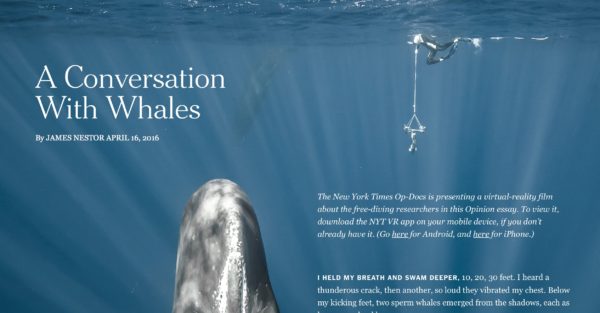
Journalist James Nestor becomes a freediver: one of a group of mostly scientists interacting with Moby Dick whales without breathing gear – spermwhales – to depths over 100 feet and for times over 5 minutes duration. They study the whales’ speech and behaviour and next, will be trying to replicate their language and hold conversations about trees and other things whales cannot see from their watery perspective. Once believed too dangerous to attempt, this group has been diving since 2007 with whales that, “can grow as long as 60 feet and weigh up to 110,000 pounds,” and eventually, Nestor dove in too:
I HELD MY BREATH AND SWAM DEEPER, 10, 20, 30 feet. I heard a thunderous crack, then another, so loud they vibrated my chest. Below my kicking feet, two sperm whales emerged from the shadows, each as long as a school bus.
The cracking was coming from the whales; it’s a form of sonar called echolocation that species of dolphins, whales and other cetaceans use to “see” underwater. With these vocalizations, called clicks, the whales were snapping three-dimensional images of my body, and those of my diving companions, from the inside out — scanning us to see if we were a threat, or if we were food.
The New York Times offers a free virtual reality film app for Android or iPhone so you can get a taste of what swimming with whales feels like.
Hat tip to Leen De Weerd-Mosley for the beautiful find.
Coral is a universe of exploding colors and brilliance, a celebration of life that we are killing

Which we are killing.
Slow Life from BioQuest Studios on Vimeo.
Solar power and new tech make the Airo bottle fill up with water from the air

The Fontus bottles use solar power to pull in moisture from the air, cool it and fill them up with water. In high humidity conditions you can have half a quart of water in an hour (less in dryer conditions). Of course, you will want the air around the bottle to be pretty free of contaminants.
More on the science of Airo and Ryde (same type bottle for cyclists) by Fontus.
Visit the Fontus website to donate to their IndieGogo campaign and get a discount on the bottle when it comes out later this year.
Can’t teach what you don’t know: some facts about climate change for students & teachers

But if you’re looking for the real facts about climate change, the NYT also developed a “cheat sheet” Short Answers to Hard Questions About Climate Change
Most Big Brand foods and personal care items are made with unsustainable palm oil and it’s killing the world
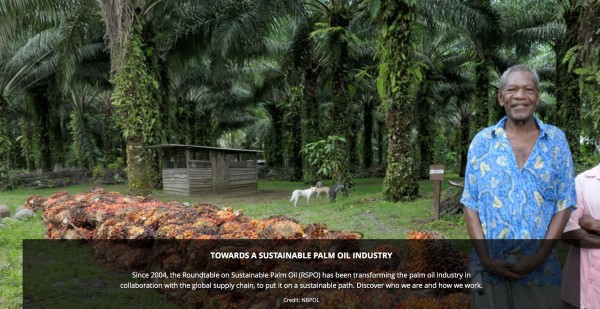
- Shop from companies listed in the RSPO’s database of sustainable-palm supporters;
- Look for the RSPO trademark on products;
- Ask retailers to offer more certified sustainable palm oil products;
- Ask manufacturers to use certified sustainable palm oil;
- Visit the World Wildlife Federation to learn about other ways to get involved.
1 Million Women also explains why checking and boycotts are so important.
100% Certified Sustainable Palm Oil (CSPO) is produced in a way that helps protect the last remaining habitat for wildlife and preserves the livelihoods of producers. By buying from companies using either CSPO or sustainable alternatives to palm oil, you can enjoy some wildlife-friendly, guilt-free chocolates.
Why is palm oil such a big issue?
When tropical forests are cleared to make way for oil palm plantations, carbon is released into the atmosphere as carbon dioxide (CO2 ), the gas that is the leading cause of climate change; tropical deforestation accounts for about10 percent of total global warming emissions (UCS 2013).
Indonesia was the world’s seventh-largest emitter of global warming pollution in 2009, and deforestation accounted for about 30 percent of these emissions (WRI 2013). Indeed, for that same year Indonesia ranked second (behind Brazil) in the amount of global warming pollution it produced because of deforestation (WRI 2013).
It’s estimated that 98% of Indonesian forest will be gone in 9 years due to palm oil plantations.
Palm Oil is a major problem, and it is up to us as consumers to make a difference. It is up to us to boycott the brands that contain palm oil, or who are not trying to source responsible palm oil, and protest against those who create this destruction…
How is standing up against sustainable palm oil going to affect the food and beauty products we use at home?
Standing up might mean giving up: crackers, ramen, chocolate eggs, easter bunnies and many commercial brands of soap – in favor of buying less commercial brand products. But that’s not necessarily a bad thing, is it? Having the chance to save the world and be healthier at the same time sounds like a pretty good tradeoff to me.
For more information on the drive to produce only sustainably harvested palm oil visit the Roundtable on Sustainable Palm Oil.
Companies want to seize publicly owned water, then sell it back to us at a profit
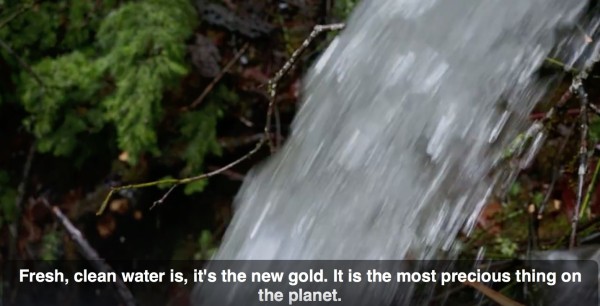
storyofstuffproject
And in New Jersey, private companies are getting ready to buy municipal water systems out from under the people – and then make customers pay them back the money they spent to buy the systems.
Taking care of ourselves, our society and our natural resources is our obligation as earth citizens. We need to get much better at doing this than we are.
March in Philly July 24 for a Clean Energy Revolution
 On the eve of the Democratic National Convention as the national spotlight shines on Philadelphia, thousands of Americans will gather on July 24 2016 to demand bold action be taken to end fracking, keep dirty fossil fuels in the ground and immediately transition toward a truly clean, renewable energy future. Will you be there too?
On the eve of the Democratic National Convention as the national spotlight shines on Philadelphia, thousands of Americans will gather on July 24 2016 to demand bold action be taken to end fracking, keep dirty fossil fuels in the ground and immediately transition toward a truly clean, renewable energy future. Will you be there too?
Together, we will march through downtown Philadelphia to call for:
- Ban Fracking Now
A ban on fracking, acid fracking and other unconventional, extreme fossil fuel extraction methods - Stop Dirty Energy and Keep Fossil Fuels in the Ground
A halt to the rapid and reckless expansion of gas and oil pipelines, frack sand mining, wastewater injection wells and other dirty fossil fuel infrastructure across the United States - A Quick and Just Transition to 100% Renewable Energy
Bold government policies to build solar, wind and other clean energy sources and energy efficiency measures in order to transition quickly to a 100% renewable energy economy
RSVP to let us know you can join us in Philadelphia!
Sunday 24 July 2016
12-6PM
Request transportation help by contacting Rita email or 732-993-8966. More information at CleanEnergyMarch.org
Indigenous women in Ecuador & allies march to defend the Amazon & protest environmental & cultural genocide
PUYO, Ecuador, March 9, 2016 – In recognition of International Women’s Day, Indigenous Amazonian women leaders of seven nationalities including: Andoa, Achuar, Kichwa, Shuar, Shiwiar, Sapara and Waorani nationalities and their international allies took action in Puyo, Ecuador, in a forum and march in defense of the Amazon, Mother Earth and for climate justice. Specifically, they came together to denounce a newly signed oil contract between the Ecuadorian government and Chinese oil corporation Andes Petroleum.
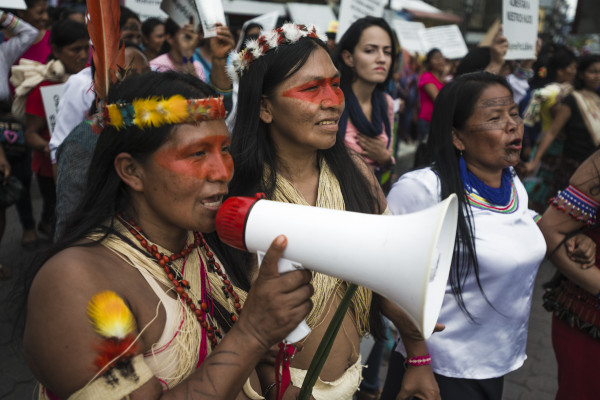
By plane, foot, canoe, and bus, some five hundred women mobilized from deep in their rainforest territories and nearby provinces marching through the streets of the Amazon jungle town of Puyo.
Chanting, “Defend the forest, don’t sell it!” and carrying signs reading “No more persecution against women defenders of Mother Earth,” the march culminated in a rally in which each nationality denounced the new oil threat and shared traditional songs and ceremonies. The women spoke of other methods for protecting and defending the Amazon and its vital living systems, making it known that the women of the Amazon are not just victims of environmental and cultural genocide, but rather are vital solution bearers.
In addition to highlighting the grave social and ecologic implications of this new contract and the Ecuadorian government’s plans to tender several more oil blocks in the pristine, roadless southern Amazon, the women and allies brought light to their struggles and the ongoing criminalization faced as they stand to protect and defend their territories and lifeways based upon living in harmony with the natural world. A tribute was held in honor of Berta Caceres, the Honduran indigenous environmental leader who was killed last week for her years of work defending rights and territories from privatization, plantations, and most recently, a mega dam project.
The women of the Amazon were also joined by Casey Camp Horinek, WECAN delegation member and Indigenous leader of the Ponca Nation of Oklahoma, who shared her traditional songs and stories of how her people have been impacted by fracking activity.
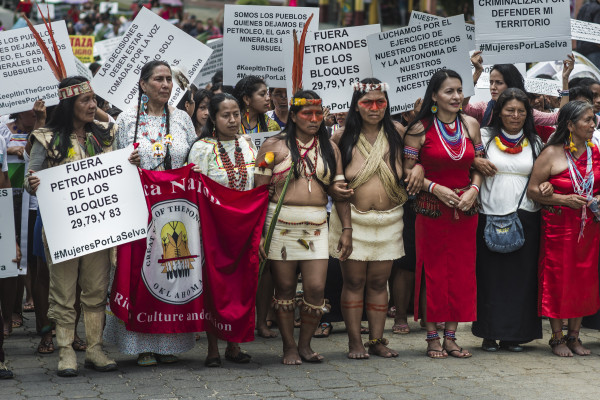
“Right now the oil company is trying to enter our territory. That is our homeland, this is where we have our chakras (gardens), where we feed our families. We are warriors, and we are not afraid. We will never negotiate,” explained Rosalia Ruiz, a Sapara leader from the community of Torimbo, which is inside the Block 83 oil concession.
“Although we are from three different provinces, we are one territory and one voice,” Alicia Cahuiya, Waorani leader declared.
As the march unfolded, the Ecuadorian government and Andes Petroleum held a meeting in the nearby town of Shell to organize an illegal entry into Sapara territory, knowing that key leaders would not be present. Outraged, a delegation of Sapara delivered a letter to the meeting, underscoring their peoples’ opposition to the oil project and governments tactics to divide the community. They successfully thwarted the government and company plans, and returned to the streets, victorious.
International allies including the Women’s Earth and Climate Action Network, Amazon Watch and Pachamama Alliance shared messages of solidarity and calls for immediate action to keep fossil fuels in the ground in the Amazon.
“On this International Women’s Day we are reaching across borders and standing together as global women for climate justice to denounce oil extraction in the Amazon and call for attention to the struggles and solutions of local women land defenders,” explained Osprey Orielle Lake, Executive Director of the Women’s Earth and Climate Action Network, “We all depend on the flourishing of these precious rainforests, the lungs of the planet. Now is the time to keep the oil in the ground and stand with the women who have been putting their bodies on the line for years to protect the forest, their cultures, and the health and well being of all future generations.”
“Today was a historic day for indigenous Amazonian women! It was the first time that hundreds of women and their allies marched for the Amazon, Mother Earth and Climate Justice. And the power of women was so strong that plans for oil companies entering Sápara territory today were halted. This is is a signal that the collective call to defend rights and territories by keeping fossil fuels in the ground is working,” says Leila Salazar-López, Executive Director of Amazon Watch.
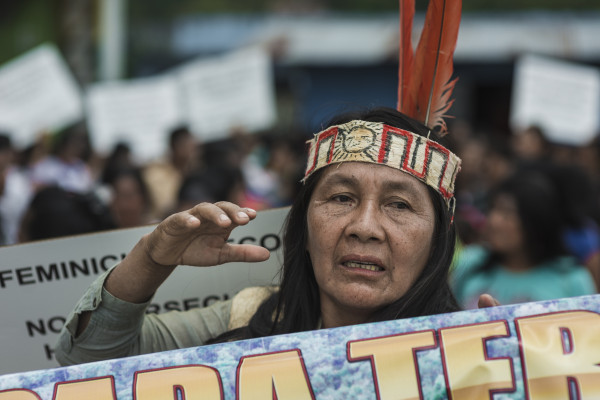
Belen Paez from Pachamama Alliance declared: “It’s a unique and historical moment to have the experience of solidarity and connection between indigenous women and activists from all over the world standing up for the rights of the Amazon rainforest and its people, we have all been waiting for this moment for so long, and that moment is now.”
The March 8 forum, action and press conference will be followed by a March 9 event and report back, ‘Women of Ecuadorian Amazon and International Allies Stand For Protection of the Amazon Rainforest’ to be held on March 9 at 17:00 at the Biblioteca FLASCO, Universidad FLACSO, Quito.
A solidarity action was also held at the Chinese consulate in San Francisco, CA, to denounce the new oil contracts on Sapara and Kichwa territory and support women’s rights in Ecuador and around the world.
A dictionary of ocean protection terms – in cartoon language!

Watch and share these short, animated cartoon videos about critical ocean issues. Fun to watch, chock full of good information! From The Pew Charitable Trusts and cartoonist Jim Toomey, the artist behind “Sherman’s Lagoon”.